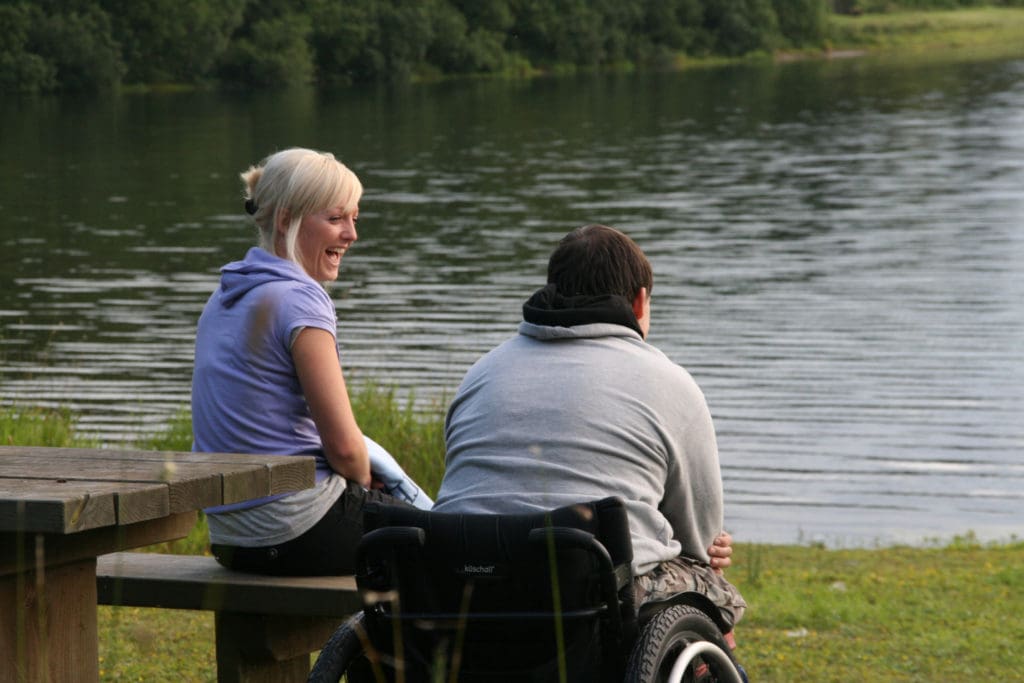Christina: “I definitely feel guilty”
2 March 2016

Four years ago, Christina got a call from her mum saying that her brother John was injured. At first, Christina’s mum said it was just a broken leg, so as not to worry her, but later that day she was told that her brother had broken his neck. “I remember thinking he was going to die,” Christina says.
“The initial two days were a blur and I think I was just on auto pilot,” Christina says. She remembers going to Newcastle, where her brother was hospitalised, to see him in the Intensive Therapy Unit (ITU). “It was terrifying,” she says.
Three days after the accident, Christina, who was 24 at the time, had her graduation ceremony. “The venue was opposite to the Royal Victoria Infirmary, where John was, so it was all very surreal,” she says.
The family didn’t know about spinal cord injury and what the condition meant to her brother’s future. Christina got most of the information online and from the doctors at the hospital. “I found all doctors were very vague,” she says. “I understand they had to be as they can’t make promises, and a lot of the outcome they genuinely can’t predict, but I struggled with this.”
At the beginning, the family was just glad that John was alive and they didn’t think too much about the impact John’s injury would have on their family dynamic.
“He lived at home for a long time after the accident and he moved out into the same village as my parents, so seeing and helping him with things does take up a lot of my parents’ time,” Christina says.
As most siblings of people with a spinal cord injury, Christina felt ‘a bit isolated’ because her parents spent more time taking care of her brother. “I’ve always been more independent than my brother, and I know he needs them much more than I do right now, so I don’t blame them for how things are or hold it against them, but that doesn’t mean I don’t feel sad that things aren’t how they were before,” Christina says.
Before her brother’s injury, they were a close family who used to go on family holidays and spent Christmas together. Things are very different now. “We do very little without my brother, which probably wasn’t the case before,” Christina says. “I feel like now every decision runs through the filter of ‘can John do that?’”
Having a brother with a spinal cord injury causes psychological distress. Feeling depressed, isolated and guilty is common amongst siblings. “I definitely feel guilty about doing things my brother can’t do,” Christina says. “I’m very aware that when he finds out that people are doing things he would like to do, it upsets him.”
For a long time, she didn’t feel comfortable to speak about her worries with her parents. “I feel like they have it bad enough already and I don’t want to make things worse.” Research has found that often siblings don’t talk about their feelings with their parents because they want to protect them.
After three years without formal support, Christina realised she was still struggling and she got in touch with Back Up’s family mentoring service. “It was helpful to chat to someone who just got it,” she says. “When you articulate things really poorly, and tie yourself up in knots and feel you can’t get yourself across, and then someone just goes ‘I know, I get it’. It’s such a relief.”
Christina feels that the mentoring experience gave her the confidence to have a conversation with her mum. “I was really nervous but we had a really good open conversation, and we’ve made a plan to make more of an effort with each other,” she says.
Christina is now training to become a family mentor herself to support people going through a similar situation.
Are you a sibling of someone with a spinal cord injury? Do you want to support others in a similar situation? Become a volunteer mentor


